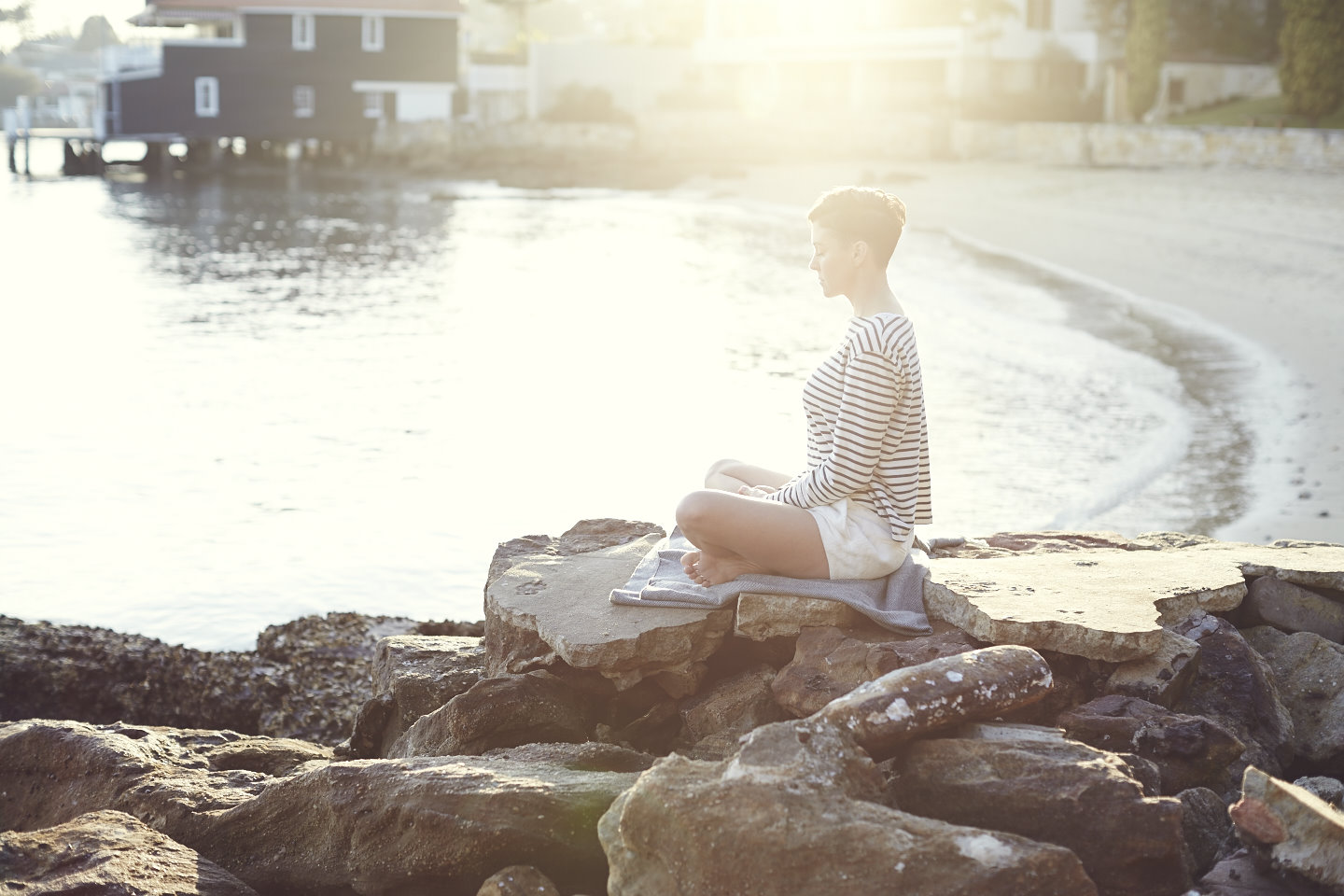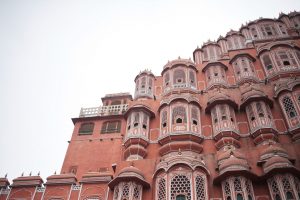Jacqui Lewis believes in high-grade living and the art of being a highly-energised, engaged and ambitious person without living your life meditating in a cave or forgoing the things you love. She’s the mastermind behind The Broad Place, a school that takes ancient knowledge and the practice of Vedic meditation and makes it easy to employ in our modern day lives. Together with her Co-founder and husband Arran Russell, she holds a range of workshops, gatherings, retreats and online programs and works practically on tools to improve communication, de-stress, retain your mind set and increase overall happiness. I’m so happy to have Jac on the site sharing her take on the fast growth of her business, stepping into fear, tackling creative blocks and having the courage to walk away from something she invested in both financially and emotionally.
Congratulations on the success of The Broad Place – you’re doing lots of amazing things all over the world! How did your concept around tools and practices to support modern living materialise?
Thank you for the kind words! The Broad Place came from mine and Arran’s recognition that we, and everyone around us, were spending a huge amount of time on the human doing parts, and not very much on developing who was the human being behind it all. We were both ‘achieving’ so much in our careers and undertaking lots of travel, and family life was really engaged, but we were also stressed out and anxious and feeling unsatisfied. After spending over a decade studying and practicing Eastern knowledge, I felt a huge desire to share this in a very modern way. We were thirsting for a platform and place that we could learn in a stylish way that was also empathetic to our crazy lifestyle and didn’t require us to go live in a monastery to experience peace, or study fine arts to live creatively. We couldn’t find this, so we created it. The Broad Place is a school sharing ancient knowledge for modern living to live with more creativity, clarity and consciousness.
Your focus is on a school for creativity, consciousness and clarity – can you talk us through this?
We teach tools for increased clarity (such as meditation), workshops and knowledge courses on consciousness and an understanding of ourselves as human beings, and creativity is a favourite as Arran and I have not only both worked in creative industries our whole lives, but we also live creatively, with constant experimentation, curiosity and exploration. We host classes, Retreats and workshops for people to engage with what creativity might mean for them.
What’s been the key to the fast growth of The Broad Place, both domestically and internationally?
I think truly living what we teach. The Broad Place is a very raw, shared forum for learning. I’m very honest in my own personal experience and continued education and would never claim to know it all or be enlightened. I’m very driven to learn and experience multiple schools of thought, practices and I think there are many paths to fulfillment. This has really resonated with our students and I feel they appreciate it immensely. It’s allowed us to build authentic relationships with our students and I think has been key to our very rapid growth.
You host retreats all over Australia and other parts of the world – can you speak about these?
We host retreats in Australia where we teach meditation and ancicent Vedic practices, our favourite is the special retreat we host at Atlantic in Byron Bay, set amongst lush palm trees and succulents and with the beach for morning yoga sessions and luxurious houses for accommodation. It’s remarkable for bundling people away and having them decompress from their daily life and open them up to learning about being more connected when they return home. We also host a yearly retreat in India!
You’ve said before that learning Vedic meditation was your own lifeline back to balance – when did you start practicing and why?
I started Vedic Meditation when my 10 year old daughter Marley was a baby, it feels like forever ago! I was ridiculously stressed and under a lot of pressure and it saved me from a challenging time. My meditation practice gave me grounding through a time that ended up resulting in a divorce, becoming a single mum and a bankruptcy. I had tried nearly every type available – people don’t realize there are so many different types of meditation and they achieve different things. Vedic gave me the opportunity to physically release stress and fatigue from my nervous system and allows the mind to dive into a deeper conscious state, it’s a transcending technique. You practice 20 minutes twice a day (many do once a day) and it’s remarkable.
What can we find you doing on a daily basis?
My days change dramatically depending on where I am teaching and what projects I am working on! I travel a huge amount to teach. However, if it’s a day in Sydney at our Paddington School it will involve waking at 5am, stretching, meditating then making a French pressed coffee and drinking it on our balcony at Palm Beach listening as the birds go crazy. We over look the ocean through trees, and can hear the waves crash and it’s magic. Then I help my daughter get ready for school and drop her off. I drive the hour into our Paddington school and listen to audiobooks and podcasts and call my friends that live in LA and NY to chat. I usually stop at one of our favourite cafés in Paddington and have a big breakfast about 10am. Once I am at The Broad Place School I will divide the day into meditation courses, mentoring and writing and on a big day it will be a 12 hour back to back day. In the afternoon I will always do my personal practice, and I usually eat a hybrid late lunch/dinner at 4pm as I will be teaching from 5.30pm straight through to 9pm or so. I have learnt to slow down through all of this intensity and not bullet through like I used to.
Aside from meditation, any interesting daily routines you’d like to share?
I wake before sunrise and do a gratitude exercise and I always tongue scrape with a copper scraper to eliminate toxins. I usually watch the sunrise which I adore. I practice KinHin, a walking Zen meditation a few times a day. After each meditation sitting, I set an intention to work with between that meditation and the next.
As a business owner, mother and a wife, how do you prioritise?
Mother first, then wife, then business owner. I learnt long ago that prioritising my work led to all sorts of unhappiness. Given the work I create and engage with, being at my personal best is an absolute must, and being fulfilled at home is incredibly important to me. Arran and I work together on The Broad Place and are fortunate to spend a lot of time together, he’s one person I never get tired of being around! We don’t bother anymore with the concept of work/life balance; I think trying to get balance is stressful. We just ensure we only work on that which we love.
In your former life you were the co-founder of a communications agency – presumably something you’d invested in financially and emotionally. How did you find the courage to walk away from this and start fresh with The Broad Place?
It was terrifying in truth. I was very ‘successful’ and very stressed. I had a grueling year of bridging between the two which taught me an enormous amount. Like everything in life, I feel that experiential learning is best! Arran and I had founded the agency together, and he kept it going for awhile with all the staff and clients. We decided that if we were really going to experiment fully with the idea of only doing that which we loved and editing out that which didn’t bring out the best in us, that we would completely carve it up. So we let all the staff go and 70% of the clients, and I worked just on The Broad Place from then on. Then for a year we only worked on The Broad Place together. Right now Arran is full time on agency creative direction work and I am solo on The Broad Place. It’s constant experimentation, evolution and stepping into fear. I find courage in the doing, not the thinking. We operate on instinct a huge amount. If it feels right, I am guided by that. As soon as something doesn’t feel right, we sit evaluate and make a move. We are always applying spiritual practice into business.
How do you tackle creative blocks?
I don’t believe in creative blocks. That’s just the ego putting up barriers and the mind buying into the concept. I believe in fatigue. But I don’t believe that creativity has a barrier to it, except thinking it has a barrier! I wish to be clear, I’m not always 100% motivated! But I do understand the power of thought. If we tell ourselves ‘oh well I’m having a creative block’ then we buy into it. I question whether this is resistance as I in fact shouldn’t be working on it, and then if I know I should be I just forge through.
How do you relate to the word adrift?
Adrift I love as a term, as for me it represents our constant state. We like to think we can ground down in a house, or career, with the things we own and by building our own identity to make us feel stable. But essentially we are constantly drifting through our own evolution. No day is the same, we wake up each day a slightly different person, we go to sleep a slightly different person. This means potential is huge. We can shift and change at any moment, and gravitate towards that which serves us. We can drift away from contraction and into our conscious expansion at each moment. It’s so beautiful and I think something that is so taken for granted.













/ Share on: